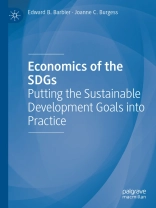This is the first book that employs economics to develop and apply an analytical framework for assessing progress towards the Sustainable Development Goals (SDGs). The authors explore the historical context for the underlying sustainability concept, develop an economics-based analytical framework for assessing progress towards the SDGs, and discuss the implications for sustainability policy and future research.
Economics is concerned with analysing the trade-offs in allocating scarce means to achieve various ends. Thus, economic methods are ideally suited to assessing how progress towards one or more SDGs may come at the expense of achieving other goals. Such interactions are inevitable in meeting the 2030 Agenda over the next decade, given that the SDGs include different economic, social, and environmental elements. Although it may be possible to make progress across all 17 goals by 2030, it is more likely that improvement toward all goals will be mixed.For example, we may have reduced poverty or hunger over recent years, but the way in which this progress has been achieved – e.g. through economic expansion and industrial growth – may have come at the cost in achieving some environmental or social goals. On the other hand, progress in reducing poverty is likely to go hand-in-hand with other important goals, such as eliminating hunger, improving clean water and sanitation, and ensuring good health and well-being.
Assessing these interactions is essential for guiding policy, so that countries and the international community can begin implementing the right set of environmental, social and economic policies to achieve more sustainable and inclusive global development.
Содержание
Historical Context of the SDGs: Introduction to the SDGs.- The SDGs and the Systems Approach to Sustainability.- Analytical Framework and Economic Assessment: Key Indicators for the SDGs.- Trends in Key SDG Indicators.- An Analytical Framework for Assessing Progress.- Applying the Analytical Framework.- Enhancing the SDGs.- Policy Implications: Policy Implications.- Are the SDGs Sufficient?.- Conclusion.
Об авторе
Edward B. Barbier is University Distinguished Professor in the Department of Economics, Colorado State University and Senior Scholar in the School of Global Environmental Sustainability. He previously held positions at University of Wyoming, University of York and the International Institute of Environment and Development. He has served as a consultant and policy analyst for a variety of national, international and non-governmental agencies, including many UN organizations, the OECD and the World Bank.Professor Barbier has authored over 300 peer-reviewed journal articles and book chapters, written or edited 24 books, and published in popular journals and media, and is considered one of the top economic thinkers on sustainability in the world.
Joanne C. Burgess is an environmental and natural resource economist with special interests in forest land use, wildlife management, trade and environment, and sustainability. She has served as a consultant and policyanalyst for a variety of national, international and non-governmental agencies, including UN organizations, the World Bank and the OECD.
Dr. Burgess has authored over 40 peer-reviewed journal articles and book chapters, written 3 books, and published in popular journals. According to Google Scholar, Dr Burgess currently has over 4, 900 citations to her work.












